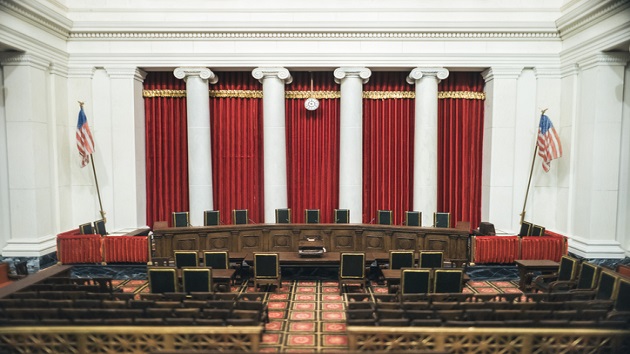(WASHINGTON) — The Supreme Court will take up the Texas abortion law on the merits next month in a rare highly-expedited case that could definitively resolve the fate of its six-week ban and unprecedented enforcement mechanism.
SB8 will remain in effect for the near future until the court issues its decision, which wouldn’t typically be expected for weeks to months after a case is argued.
The justices granted the request of Texas abortion providers and civil rights groups to hear the case before lower courts ruled on the law, meaning the law will remain in effect for now.
They also said they would also examine the question of whether the U.S. government, in a separate case, could even seek an injunction against a state law like the one in Texas.
Oral arguments are set for Nov. 1 — one month before the court is already set to hear a milestone abortion rights case out of Mississippi.
The court said it deferred a decision on the Justice Department’s emergency request for the court to put SB8 back on hold and that it would wait for oral arguments before taking action. Justice Sonia Sotomayor dissented.
“I cannot capture the totality of this harm in these pages. But as these excerpts illustrate, the State (empowered by this Court’s inaction) has so thoroughly chilled the exercise of the right recognized in Roe as to nearly suspend it within its borders and strain access to it in other States. The State’s gambit has worked. The impact is catastrophic,” she said in her dissent.
Advocates and providers wanted to see the court lift the abortion ban while it took up the case.
“Texans deserved better than this,” said Amy Hagstrom Miller, founder and CEO of Whole Woman’s Health and Whole Woman’s Health Alliance that operates four clinics in Texas.
“The legal limbo is excruciating for both patients and our clinic staff. Lack of access to safe abortion care is harming our families and communities and will have lasting effects on Texas for decades to come. We’ve had to turn hundreds of patients away since this ban took effect, and this ruling means we’ll have to keep denying patients the abortion care that they need and deserve,” she said in a statement.
Planned Parenthood Federation of America shared the sentiment.
Alexis McGill Johnson, president and CEO of Planned Parenthood, called SB8 a “heinous and blatantly unconstitutional abortion ban that never should have been allowed to take effect—and it’s devastating that it remains in place.”
“Every day S.B. 8 is in place is one more day of cruelty, and it cannot stand. We look forward to our patients and providers finally having their day in court on November 1, when the Supreme Court will hear the cases. And we are hopeful the Court will step in and block S.B. 8 from continuing to wreak havoc,” she said in a statement.
The law bans physicians from providing abortions once they detect a so-called fetal heartbeat, which can be seen on an ultrasound as early as six weeks into a pregnancy.
Under SB8, private citizens — including those who live outside of Texas — can sue a person they “reasonably believed” provided an illegal abortion or assisted someone in getting it in the state, up to four years after the act. Government officials are expressly prohibited from enforcing the law.
At least one anti-abortion organization praised the court for maintaining the law while it determines whether it is constitutional.
Texas Right to Life, in a tweet, called the move a “great victory for the Pro-Life movement.”
Copyright © 2021, ABC Audio. All rights reserved.












